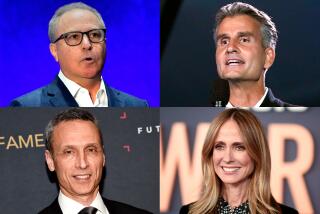A Question of Leadership : Apple’s Reclusive Chairman Joins CEO on the Hot Seat as Firm Seeks to Regain Footing
- Share via
CUPERTINO, Calif. — As Apple Computer lurches along in crisis mode, beset by losses, operational problems, executive departures and incessant takeover rumors, more and more observers are questioning the leadership not only of much-maligned Chief Executive Michael Spindler, but of the company’s reclusive chairman, Armas C. “Mike” Markkula Jr.
The unsung third founder of Apple, Markkula is a onetime Intel marketing executive who provided timely financing and adult supervision to wunderkinds Steve Wozniak and Steve Jobs. He’s always been the kingmaker at Apple, the man who hired and fired CEOs, but his reclusive ways have recently left many wondering whether anyone is in charge at all.
Markkula made a rare public appearance at Apple’s annual shareholders meeting, declaring that “Apple is not for sale” and that Spindler has the full support of the board of directors.
But in the face of a Wall Street Journal report that a buyout of Apple by Sun Microsystems is “imminent,” few seemed to take the chairman’s denial seriously: Sun stock took a dive and Apple shares rose as investors bet that a deal was indeed in the works. And many analysts and investors believe that in the absence of a deal, Spindler must be fired.
Markkula and Apple’s board have not handled previous CEO changes with complete candor. When John Sculley was pushed aside in favor of Spindler, Markkula and the board insisted that it was an amicable change and that Sculley would stay on as chairman--but he quickly departed.
Former Apple executives and others in the small circle of people who know Markkula say he has a special affection for Spindler, which may explain his reluctance to take decisive action. The two men are former engineers who share a love of talking about technology, something that Markkula could not do with former PepsiCo marketeer Sculley.
“If Spindler does go, it will be gently,” said a former Apple executive. “Mike loves Spindler.”
Markkula also loves airplanes--he owns ACM Aviation, an airplane leasing company--and skiing, which one friend says is what he was doing last week even as Apple was announcing losses and layoffs. What he doesn’t love is being closely involved in the technology industry. He eschews the conferences, parties and restaurants where Silicon Valley executives and engineers share cocktails and talk shop.
“Mike [Markkula] is a recluse. He doesn’t know what’s going on. He doesn’t know who’s cutting the deals,” said one Apple insider. In the rare meeting he has with Apple employees, Markkula is often quiet, and his silence sometimes makes others uncomfortable, sources say.
Although Markkula has always been quiet publicly, former Apple executives say that in the past he was active behind the scenes. But today there’s little evidence of such involvement.
And that detachment in some ways characterizes the entire Apple board. Of the other members, only National Semiconductor Chief Executive Gilbert Amelio hails from the computer technology industry. New York venture capitalists Bernard Goldstein and Peter Crisp, and B. Jurgen Hintz, who ran Procter & Gamble’s food business in the ‘80s--as well as newer board members Katherine Hudson and Delano Lewis--are said to defer to Markkula during board meetings. The board lost its one strong voice when venture capitalist Arthur Rock left two years ago.
“Apple’s board has behaved like most in the Silicon Valley,” says venture capitalist Don Valentine, who funded Apple and is now chairman of high-flying Cisco Systems. “The chief executive makes all the decisions but one, and that is: Who will be chief executive?
“It’s a tough call as to when to make the change,” Valentine continues. “Generally, it happens when the noise level from the shareholders becomes insufferable. Then the board members become galvanized to take action.”
Certainly shareholders are none too happy at the moment.
“We look to the board to navigate [the company] through the rocks and shoals and into safe harbor,” shareholder Richard Ash of Philadelphia said at Tuesday’s annual meeting. “The issue is judgment . . , and there’s been a lack of judgment in the leadership of this company.”
Many Apple watchers marvel that Spindler is still at the helm. “I would have thought he [would have] been gone a long time ago,” said one computer industry executive. Spindler was supposed to be a solid hands-on operating executive, but over the last year Apple has had severe problems with demand forecasting and other day-to-day issues, and has not been able to compete profitably amid industrywide price wars.
Since the announcement of a $69-million loss for the final quarter of calendar 1995, Apple disclosed a restructuring plan that many viewed as a half-measure. The company said it would lay off 1,300 people and focus more tightly on high-end systems, but provided few details. And little more information was forthcoming on Tuesday.
One possibility is that Apple is simply stalling until a sale can be completed. But in that case, many will wonder why Markkula and the board didn’t sell the company last year, when popular Chief Financial Officer Joseph Graziano was reportedly advocating such an action--and suitors were offering more money.
Graziano was ousted when Markkula sided with Spindler against the sale. But the chairman, many analysts say, was backing the wrong horse.
* ‘NOT FOR SALE’
Apple chairman seeks to quell reports that Sun Microsystems is close to buying Apple, but a deal makes sense. D6
(BEGIN TEXT OF INFOBOX / INFOGRAPHIC)
Downward Trend
Apple Computer Inc.’s share price has fallen during a period in which other technology stocks have soared. Quarterly highs since 1990 and latest:
Tuesday: $31.625
Sources: TradeLine, Assoicated Press






